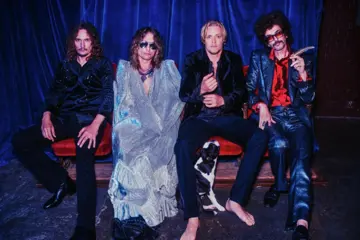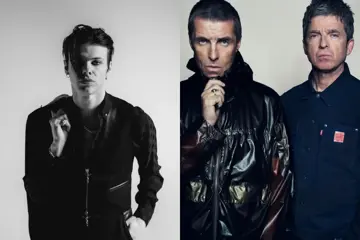Once upon a time, somewhere in the early-2000s, you couldn't sneeze without falling over Brisbane indie stalwarts Dollar Bar in a dingy den, bashing out perfectly solidified chunks of acerbic pop charisma. Starting out in its nuclear fashion as a launchpad for Dale Peachey's barbed bedroom compositions, the ideas spread like wildfire until Chris Yates, Patrick McCabe and Brendan Rosenstengel forged a dynamic that channelled their shambolic power. Yates and McCabe grew as songwriters in their own right, and by the launch of 2004's debut self-titled album it seemed that the world was about to become their dominion.
Then they fizzled up and went away.
It seemed an almost inconsequential dissolution – the world continued to turn, and churn out other acts to take their mantle – yet Dollar Bar's impact was felt most when three years ago they “reformed” for a friend's birthday. The itch was back. But things weren't easier, not least because they were by now geographically spread up and down the east coast.
“So much has happened since 2004; we have all got things going on, jobs and families and such, that the tyranny of distance wouldn't make that much of a difference in trying to all be in the one place at the one time,” bassist McCabe counters. “But we do fit it in. Back in the day we used to rehearse weekly, and we did that for a very long time. We could work wholeheartedly on the band, and Chris and I were running a record label too. But I think we do still work on Dollar Bar a lot, it is all just so remote now. I think in many ways that is why it's working so well.”
Not that McCabe believes they need the space; yet inadvertently the time apart has led Dollar Bar to come full circle to what drew them together in the first place. “I think we just got drained back then,” McCabe admits. “We had been going for a while and looking back, a mature me would have put his hands up and said, 'Hey, this is getting a little much, let's just take a break for a little while'. But instead, I decided to leave wholesale and move overseas for a while, and was willing to leave it at that. We had been pushing so hard to get supports, get on the radio; things I certainly don't regret, but I think we went away from enjoying music by trying to make it absolutely everything. So when we came back and started playing, it surprised us that it clicked so well; there was muscle memory on most of the songs, and you come to think, 'Holy shit, these songs are really great!' There were grins everywhere, so it didn't take much to go from there to trying to write some new ones.”
Don't miss a beat with our FREE daily newsletter
The fruits of this laconic labour take shape in the form of Paddington Worker's Club, a sophomore ten years after the eponymous debut. The songs themselves show that the boys haven't gotten stale; in fact the songwriting has become more intricate and audacious whilst still intrinsically Dollar Bar. The title itself echoes their journey – a hallowed hall, now defunct, yet just the murmur of its name brings memories flooding back.
“That name came from social media in a way, because there are connections we've made since starting up again with younger fans who all cited that period – with the Worker's Club and The Alley at Milton Bowl, the all-ages shows – as when Dollar Bar was at its height,” McCabe muses. “There were lots of bands doing it, like Sekiden and Girls Germs and The KT26ers, playing all ages at tiny venues. I think that period inspired the next wave of people to look to start their own bands, their own venues, to open it up to people. I've always liked albums named after or for a place, and to give it a real Brisbane feel. It ticked all the boxes.”
Paddington Worker's Club has nary a lick of polish on it, eschewing the production values of the band's previous releases for a more ad hoc GBV-influenced approach to recording. It lends a sense of urgency, a wilful carelessness, that McCabe feels embodies what the band have always stood for.
“It was a deliberate kneejerk reaction to the way we've done things in the past,” he offers. “That polished sound was something I liked at the time, and I still do. But when we released a lot of demos and live tracks on Bandcamp a couple years ago, we were listening to a lot of first takes where the vocals are rawer, which is us in a live setting. Plus because we live in different cities, we don't have a lot of time together. Once we had a take we were happy with, we moved on. 'Next'.”
The energy is back; the expectations and fervour heightened due to the “special” nature of their sporadic shows. The shows themselves are looser, more carefree, just the way we like 'em. So, what's the future hold for Dollar Bar?
“Whenever we get together now it is fun,” McCabe enthuses. “The recording and the mixing, hearing the songs back, it was all an enjoyable experience. And seeing as gaining support or attention doesn't matter at all to us anymore, we can make things raw and rough; we care a little less about making things perfect. It really is only about having a good time now; hanging out, playing great music with your best mates.”















